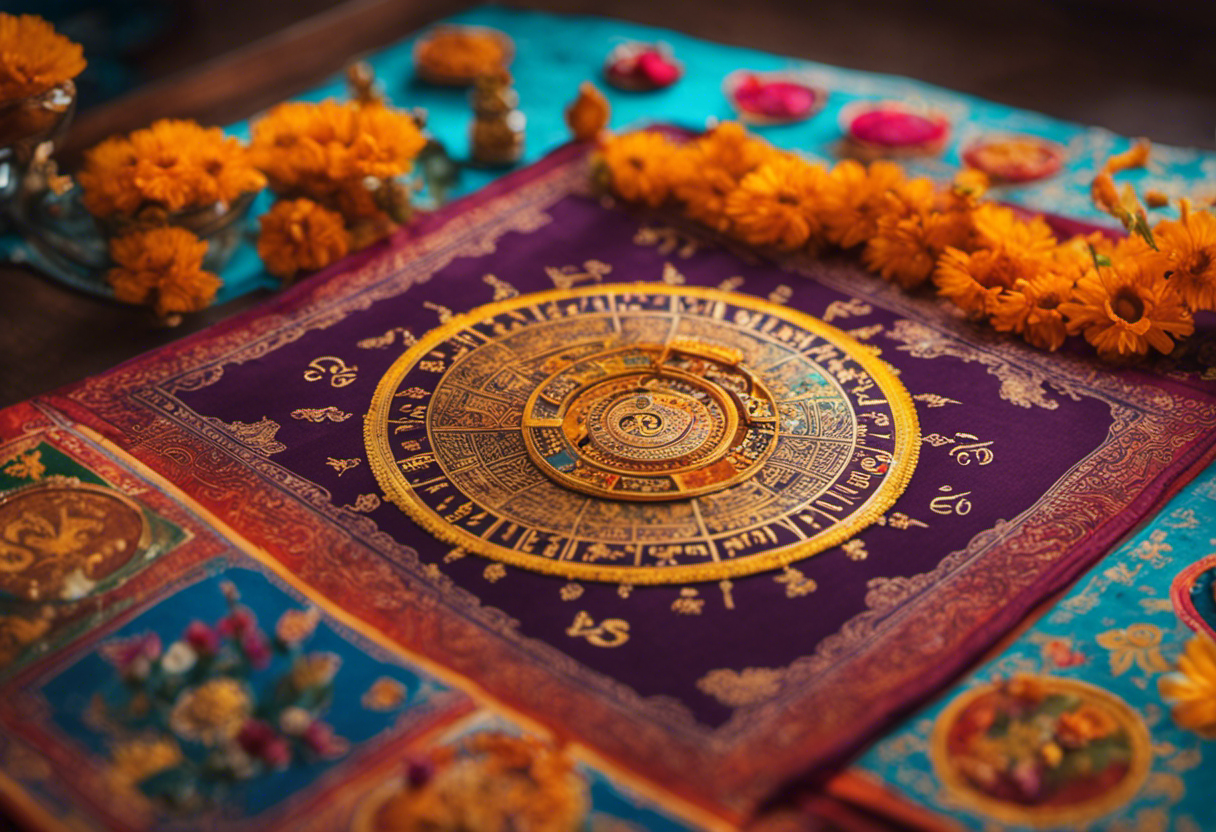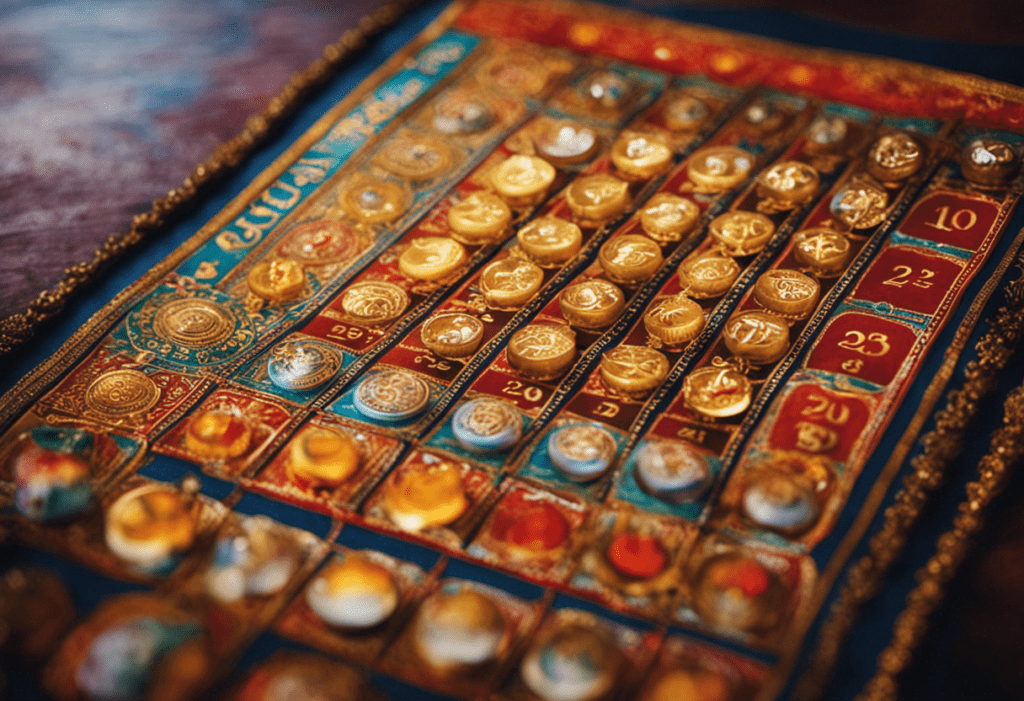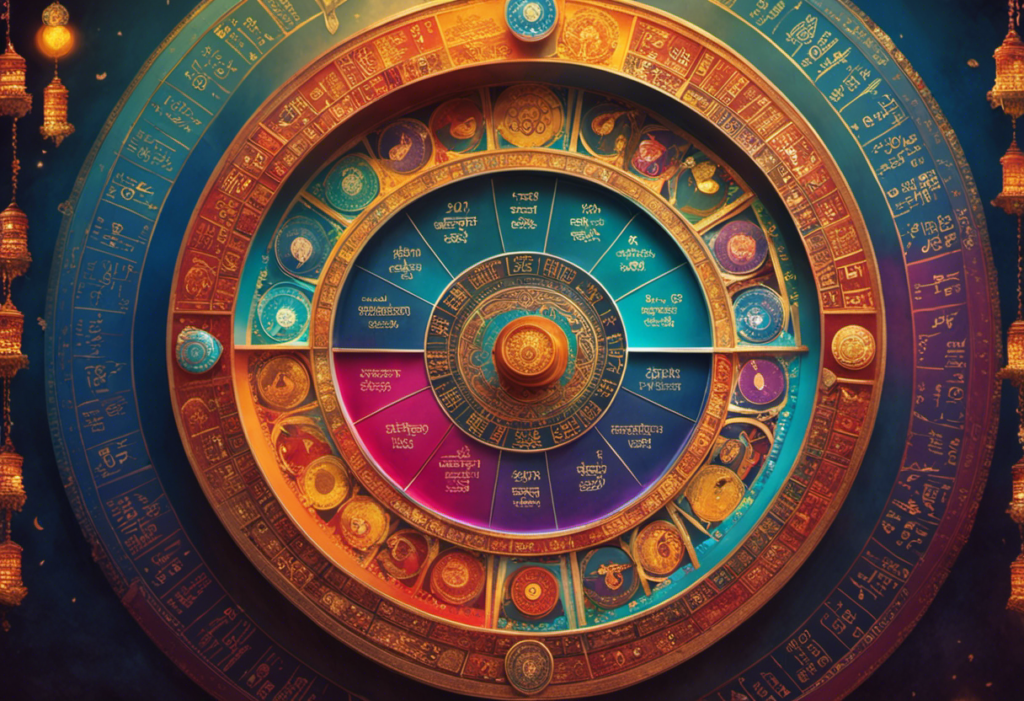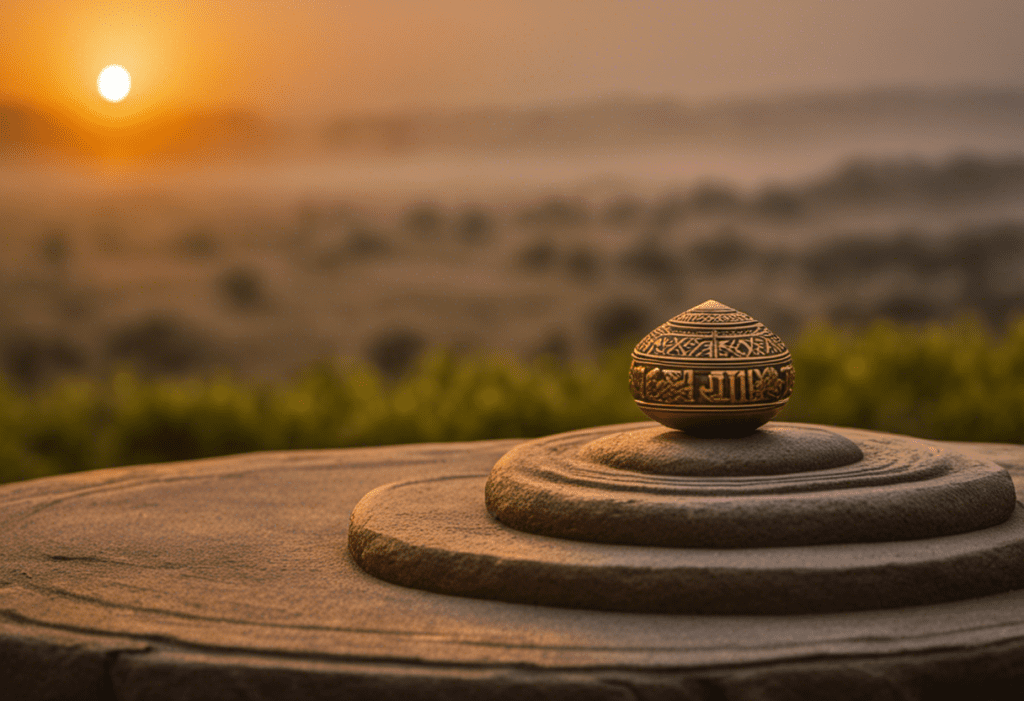In the vibrant tapestry of Hinduism, the concept of tithis in Vikram Samvat stands as an integral element, guiding the faithful in their religious endeavors. These celestial markers, rooted in the lunar cycle, hold profound significance in numerous auspicious ceremonies and festivals.
This article delves into the origins and importance of tithis, shedding light on the intricate interplay between time, tradition, and spirituality. By adhering to tithis, devotees navigate the complex web of auspicious timings, enriching their spiritual journey.
Key Takeaways
- Tithis in Vikram Samvat originated from ancient Hindu scriptures and astronomical calculations.
- Tithis play a crucial role in determining auspicious and inauspicious times for religious and social events.
- Following the lunar calendar and observing tithis is believed to bring personal growth and spiritual development.
- Tithis help in identifying auspicious days for religious ceremonies, festivals, and rituals.
The Origin of Tithis in Vikram Samvat


The origin of tithis in Vikram Samvat can be traced back to ancient Hindu scriptures and astronomical calculations. Tithi, derived from the Sanskrit word ‘tith’, means a lunar day. It is an essential concept in Hindu astrology and calendar systems, including Vikram Samvat. The lunar cycle forms the basis for determining tithis.
According to Hindu scriptures, the lunar month is divided into thirty tithis, with each tithi representing the longitudinal angle between the Sun and the Moon. The duration of a tithi varies, as it is determined by the moon’s movement and its position relative to the Sun. The calculation of tithis involves complex astronomical formulas and algorithms that consider the mean motion of the Moon.
The ancient Hindu scriptures, such as the Vedas and the Puranas, provide detailed descriptions of the origin and significance of tithis. They emphasize the importance of tracking the lunar cycle to determine auspicious and inauspicious times for various activities, rituals, and ceremonies.
The concept of tithis in Vikram Samvat serves as a guide for the Hindu community in planning and organizing religious events, festivals, and daily routine activities based on the lunar calendar. It is a testament to the deep connection between astronomy, spirituality, and the cultural fabric of Hindu society.
Significance of Tithis in Hinduism


The significance of Tithis in Hinduism encompasses various aspects.
Firstly, Tithis play a crucial role in the lunar calendar, helping determine the auspicious and inauspicious times for various religious and social events.
Secondly, Tithis are associated with specific rituals and ceremonies, such as fasting and offering prayers, which are performed on certain Tithis to seek blessings or fulfill religious obligations.
Lastly, Tithis also hold astrological significance, with each Tithi being ruled by a specific planet, influencing the energies and outcomes of actions performed on that particular Tithi.
Lunar Calendar Importance
Lunar calendar plays a crucial role in Hinduism due to the significant influence of tithis. Tithis are the lunar days that mark the progression of the lunar cycle. They are based on the positions of the Sun and the Moon and are considered sacred in Hindu religious observances.
Here are three reasons why the lunar calendar and tithis hold such importance in Hinduism:
- Determining Auspicious Days: Tithis help in identifying auspicious days for various religious ceremonies, festivals, and rituals. Hindus believe that performing these activities on the right tithi can enhance the positive outcomes and blessings.
- Spiritual Significance: Tithis are believed to have a spiritual impact on individuals. Each tithi is associated with specific deities and energies, and observing the rituals on specific tithis can help in invoking these divine energies.
- Personal Growth: Following the lunar calendar and observing tithis is believed to bring personal growth and spiritual development. It helps in aligning oneself with the natural cycles and rhythms of the universe, leading to a deeper connection with spirituality.
Rituals and Ceremonies
As tithis play a significant role in Hinduism, understanding their significance in rituals and ceremonies is essential. Tithis are considered auspicious for performing various ritual practices and cultural traditions in Hinduism. The lunar calendar, based on the tithis, guides the timing of these ceremonies.
Rituals and ceremonies are an integral part of Hindu culture and are performed to honor deities, seek blessings, and commemorate significant events. The tithis determine the most favorable dates for these activities.
For example, the celebration of Diwali, the festival of lights, is held on the darkest night of the month, known as Amavasya tithi. Similarly, weddings, housewarming ceremonies, and other auspicious occasions are planned according to the specific tithis that are considered propitious.
Understanding the significance of tithis in rituals and ceremonies allows individuals to engage in these cultural practices with a deeper understanding and appreciation for their religious and traditional roots. It also ensures that these rituals are performed at the most appropriate times, according to Hindu beliefs.
Astrological Significance
How do tithis hold astrological significance in Hinduism?
Tithis, or lunar days, play a vital role in astrological interpretation and have a significant impact on daily activities in Hindu culture. Here are three key points explaining their importance:
- Determining Auspicious Days:
Tithis help in identifying auspicious days for various activities like weddings, housewarming ceremonies, and starting new ventures. Each tithi has its own energy and influence, and astrologers consider these factors to determine the most favorable time for specific events. - Daily Horoscope:
Tithis are also used in creating daily horoscopes. They provide insights into the overall energy of the day and help individuals plan their activities accordingly. Certain tithis are considered more favorable for specific tasks, while others are believed to bring challenges. - Panchang:
Tithis are an essential component of the Panchang, the Hindu almanac. The Panchang provides detailed information about tithis, nakshatras, and other astrological aspects, enabling individuals to make informed decisions and align their actions with cosmic energies.
Understanding the astrological significance of tithis allows individuals to navigate life’s events with greater awareness and alignment with the celestial forces.
Understanding the Lunar Cycle in Vikram Samvat


During the course of Vikram Samvat, the lunar cycle is comprehended by observing the movement of the moon in relation to the sun and the earth. Understanding lunar phases is crucial in determining the lunar calendar’s significance in Vikram Samvat.
The lunar cycle consists of different phases, starting with the new moon and progressing through the waxing phase, culminating in the full moon, and then entering the waning phase until the next new moon. Each phase has its own significance and is associated with specific activities and rituals.
In Vikram Samvat, the lunar calendar holds great importance as it serves as a guide for various religious and cultural events. The lunar calendar determines the dates for festivals, auspicious occasions, and religious ceremonies. It also influences agricultural practices, as farmers rely on the lunar phases to determine the best time for planting and harvesting crops.
Moreover, the lunar calendar in Vikram Samvat helps in understanding the cosmic rhythm and aligning oneself with the natural cycles of the universe. It allows individuals to establish a connection with nature, fostering a sense of harmony and balance in their lives.
The Role of Tithis in Religious Ceremonies


The role of tithis in religious ceremonies is significant as they serve as markers for auspicious dates and times, ensuring that rituals and practices are conducted at the most favorable moments.
Tithis, which are based on the lunar phases, play a crucial role in determining the timing of various religious events and ceremonies in Vikram Samvat. Here are three important ways in which tithis impact religious ceremonies:
- Determining Auspicious Dates: Tithis help in identifying favorable dates for conducting religious ceremonies such as weddings, housewarming ceremonies, or the initiation of new ventures. By aligning these events with specific tithis, individuals believe that they can maximize the positive energy and blessings received.
- Timing of Rituals: Tithis play a vital role in determining the most appropriate time of day to perform religious rituals. Different tithis are believed to have different energies and influences, and performing rituals during the right tithi is thought to enhance their effectiveness.
- Observance of Festivals: Tithis also guide the timing of religious festivals. The dates of major festivals in Vikram Samvat, such as Diwali and Navratri, are determined based on the lunar calendar and the specific tithis associated with them.
Adhering to Tithis for Auspicious Timings


Many individuals consciously follow and adhere to specific tithis in order to ensure auspicious timings for their important events and ceremonies. In the Hindu calendar system, tithis play a crucial role in determining the favorable times for various activities. Adhering to tithis is believed to bring blessings and positive outcomes.
The concept of adhering to tithis for auspicious timings is deeply rooted in the belief that the position and movement of celestial bodies influence the energy and vibrations of a particular time. Each tithi is associated with certain planetary alignments and astrological significance. By aligning their activities with the appropriate tithi, individuals seek to harness the positive energies and maximize the chances of success.
For example, weddings are often scheduled on specific tithis believed to bring marital harmony and prosperity. Similarly, starting a new business venture, buying a property, or performing religious rituals are all carefully timed based on the auspicious tithis.
To adhere to tithis for auspicious timings, individuals consult astrologers or refer to specialized calendars that indicate the most favorable tithis for specific activities. It is believed that by following these tithis, individuals can enhance their chances of success and avoid any potential negative influences.
Celebrating Festivals According to Tithis


Interestingly, festivals in the Hindu calendar are often celebrated according to the specific tithis, ensuring alignment with the auspicious energies associated with those days. The tithis are based on the lunar phases and play a significant role in determining the timing of various religious and cultural events.
Here are three reasons why celebrating festivals according to tithis is important:
- Aligning with celestial energies: Tithis are believed to be influenced by the celestial bodies, particularly the Moon. By celebrating festivals on specific tithis, individuals aim to tap into the positive energies associated with those lunar phases, enhancing the spiritual significance of the event.
- Preserving ancient traditions: Celebrating festivals according to tithis is an age-old tradition that has been passed down through generations. It helps preserve the rich cultural heritage and ensures that the festivals are observed in accordance with the ancient scriptures and practices.
- Creating a sense of unity: Following tithis for festival celebrations helps create a sense of unity among the Hindu community. When individuals come together to celebrate festivals on the same tithi, it strengthens social bonds and fosters a feeling of belongingness.
Conclusion
In conclusion, the concept of Tithis in Vikram Samvat holds great significance in Hinduism.
It is deeply rooted in religious ceremonies and plays a vital role in determining auspicious timings for various events.
By understanding the lunar cycle and adhering to Tithis, individuals can ensure the success and prosperity of their endeavors.
Celebrating festivals according to Tithis further strengthens the connection between individuals and their faith.
Embracing these traditions fosters a sense of unity and spirituality within the Hindu community.




